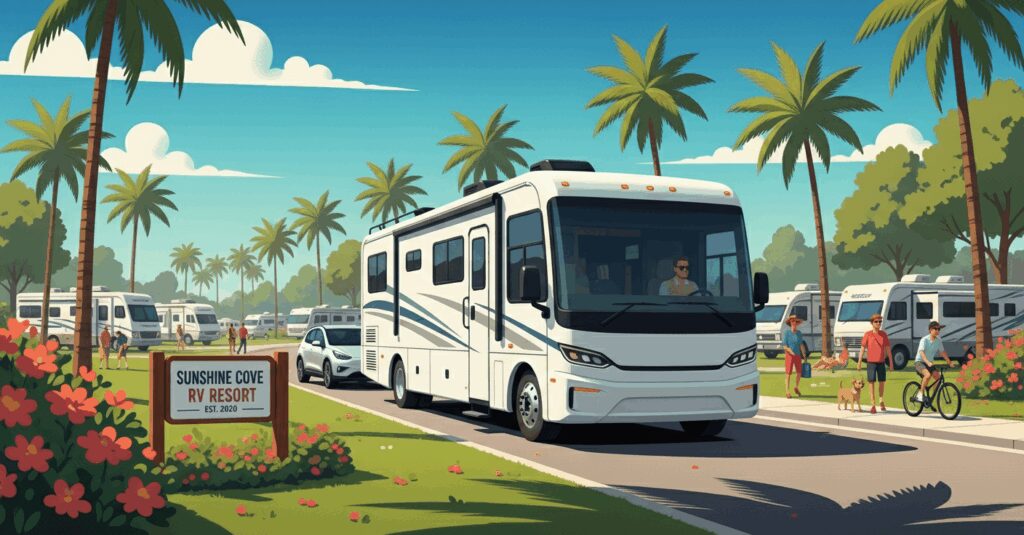The RV industry is evolving rapidly, and Florida — with its year-round travel appeal, large snowbird population, and thriving RV park ecosystem — is often at the leading edge.
What was cutting edge in 2020 is now standard or obsolete. In this update, we explore the top RV trends shaping 2025 and beyond in Florida: from electric trailers to high-tech smart systems to evolving campground models.
Recent Innovations in the RV Industry
- Pebble Flow EV Trailer: All-electric trailer with a 45 kWh battery, up to 7 days off-grid. Read more.
- Lightship AE.1: New electric RV trailer entering production in 2025 with integrated solar and aerodynamic design. Read more.
- Winnebago Electric RV: Showcased at Florida RV SuperShow, highlighting the future of electrified motorhomes. Read more.
Florida RV Market Outlook & 2025 Industry Trends
Nationally, the RV industry is seeing signs of stabilization. In May 2025, RV wholesale shipments declined about 5.6% year over year, reflecting cooling demand after recent peaks. Meanwhile, the RV Industry Association continues to publish monthly snapshots showing moderate volume in 2025.
Forecasts remain cautiously optimistic: some analysts project modest growth over the next few years, though supply chain pressures, inflation, and high interest rates are shaping buyer behavior. Meanwhile, niche innovation is accelerating, particularly around electrification, smart systems, and outdoor living enhancements.
In Florida specifically, the picture looks more positive. The state has one of the largest concentrations of RV owners in the U.S., bolstered by seasonal visitors from the Northeast and Midwest.
According to Visit Florida, nearly 140 million people visited the state in 2024, many of them driving or renting RVs. RV dealers along the I-75 corridor (Ocala, Tampa, Fort Myers) report brisk interest in both new and used models, even as financing rates create challenges for some buyers.
Another trend shaping the Florida RV landscape is demographics. While retirees remain a large and important market, a growing share of younger professionals and families are choosing RVing as a flexible way to travel.
Millennials and Gen Z buyers are especially drawn to compact and sustainable models, viewing them not just as vacation vehicles but also as part-time living spaces for remote work. Florida’s beaches, springs, and year-round camping opportunities make it a particularly attractive market for this younger demographic.
Top RV Design & Feature Trends in Florida for 2025
Electric & Hybrid RVs and Travel Trailers
One of the most talked-about developments is the emergence of electric and hybrid RVs and trailers. Florida, with its long highway corridors and abundant sunshine, is an ideal testing ground for these models.
Brands like Pebble, Lightship, and Winnebago are pushing the envelope with electric powertrains, solar integration, and regenerative braking systems.
For buyers, the appeal is twofold: reduced fuel costs and quieter, cleaner operation when camping.
However, challenges remain. Charging infrastructure in Florida is improving but still concentrated along major highways and urban centers. For RVers planning trips to remote springs, the Everglades, or panhandle beaches, range anxiety is a real concern.
Park owners who invest early in EV charging stations are likely to gain a competitive edge, particularly in destination markets like Sarasota, Naples, and the Keys.
Smart Technology & Connected RV Systems
Smart home-style integrations are now expected in modern RVs. From touchscreen panels controlling lighting, HVAC, and slide-outs to mobile apps that let you monitor battery status remotely, connectivity is shaping the next generation of rigs.
Many Florida RV buyers want the same conveniences they have in their condos or homes. This trend is especially important for remote workers who rely on stable Wi-Fi, 5G boosters, and integrated office setups while spending winters in the Sunshine State.
Dealers report that buyers increasingly ask about “work-from-RV” capabilities. Manufacturers are responding with floor plans that include fold-down desks, ergonomic seating, and wiring for multiple monitors.
For park owners, providing robust internet and shaded co-working spaces can be a differentiator when marketing to digital nomads.
Outdoor Living: Patios, Decks & Entertainment
To maximize Florida’s favorable climate, RVs are being designed with more seamless indoor-outdoor transitions. Fold-down patios, retractable decks, outdoor kitchens, and weatherproof entertainment systems are now popular selling points.
In many ways, this trend reflects Florida’s resort culture, where outdoor living is central to the lifestyle.
Buyers considering Florida road trips often look for models with shade structures, screened porches, and built-in grills. These features enhance not only leisure travel but also extended seasonal stays, turning an RV site into a true outdoor living room.
Off-Grid Power, Solar & Energy Efficiency
Off-grid capacity is no longer a niche. Solar arrays, lithium-ion batteries, and hybrid inverters are standard in many 2025 RVs.
In Florida, where boondocking opportunities exist in state forests and water management lands, this technology allows travelers to extend stays away from crowded campgrounds. Buyers are also motivated by rising campground electricity fees, which can add up quickly during long seasonal stays.
Park owners are adapting by offering tiered power packages, with premium sites including solar shade canopies or energy-efficient hookups. This not only appeals to eco-conscious travelers but also helps parks reduce operating costs.
Lightweight Vans, Teardrops & Compact Options
Compact models are gaining traction, especially among first-time buyers. Many younger families in Florida suburbs are choosing teardrop trailers or Class B vans that can be towed or driven with everyday vehicles.
These rigs fit better into urban driveways and often qualify for lower insurance rates. Dealers note that compact RVs are popular among residents of Miami, Orlando, and Tampa who want weekend getaway options without committing to a massive fifth-wheel.
This trend also connects to remote work and flexible travel. Compact rigs can double as mobile offices or guest spaces, and their smaller size makes them more fuel-efficient for long drives down I-95 or across the panhandle.
Modern Styling & Tiny-Home Influences
Design aesthetics are shifting to align with Florida’s coastal lifestyle. Lighter woods, coastal color palettes, minimalist storage solutions, and tiny-home-inspired layouts are in demand. Buyers want spaces that feel airy and stylish, not cramped or dated.
This is especially true for seasonal snowbirds who want their RV to feel like a true second home, not just a vehicle.
Florida RV Parks & Campground Trends for 2025
Luxury RV Resorts & Premium Amenities
Florida is seeing a surge in luxury RV resorts, particularly in coastal areas and around retirement hubs. These resorts offer more than just hookups; they feature pools, golf courses, spas, restaurants, and concierge services.
In some cases, they resemble gated communities rather than campgrounds. For investors, these properties can generate higher returns by attracting long-term seasonal residents who are willing to pay premium rates.
Smart Park Infrastructure & Guest Tech
Campground owners are racing to integrate smart technology, from app-based reservations to license plate recognition at gates. EV charging stations are a natural extension of this trend, with some resorts now offering Level 3 fast chargers.
Wi-Fi remains one of the most requested amenities, and parks that provide enterprise-grade connectivity are seeing stronger occupancy from younger travelers and remote workers.
Sustainable Campground Design & Eco Upgrades
Florida’s natural beauty is both its draw and its vulnerability. Many parks are investing in eco-friendly upgrades such as native landscaping to reduce water use, rainwater catchment systems, and solar-powered common areas.
These initiatives not only appeal to environmentally conscious guests but also help parks manage costs and comply with evolving regulations.
Lot Ownership & Long-Term Leasing Models
Lot ownership is expanding in popularity, with some parks selling deeded lots much like condos. Seasonal visitors from Canada and the Midwest, in particular, are interested in securing a permanent spot they can return to each winter.
This hybrid model blurs the line between traditional campgrounds and residential communities, reshaping Florida’s RV real estate market.
Challenges: Weather, Insurance & Zoning
Florida’s climate presents ongoing challenges. Hurricanes, heavy rains, and flooding risks make RV insurance necessary. Park owners must design with resiliency in mind, elevating infrastructure, reinforcing common buildings, and investing in backup power.
Buyers also face higher insurance premiums for RVs stored in Florida, making it critical to shop carefully and review coverage options. Zoning restrictions in some counties also limit where new RV resorts can be developed, adding to the complexity for investors.
Actionable Takeaways for Florida RV Buyers & Park Owners
- Buyers: Prioritize off-grid capacity, smart systems, and outdoor living features. Consider insurance and financing early to avoid surprises.
- Dealers & Builders: Stock models with electrification options and highlight compact rigs for younger buyers in urban areas.
- Park Owners: Invest in EV charging, robust Wi-Fi, and storm-resilient infrastructure to future-proof your park.
- Investors: Focus on luxury resort-style parks and lot ownership models, which appeal to high-income seasonal visitors.
Be sure to protect your investment with the right RV insurance at GreatFlorida Insurance. Our knowledgeable agents can help find the right RV coverage for you.



